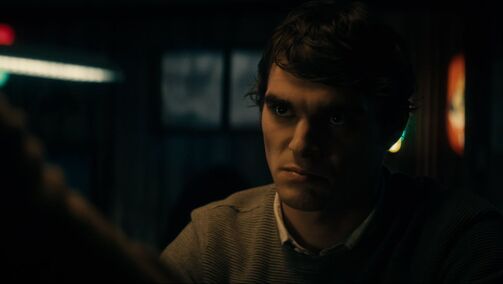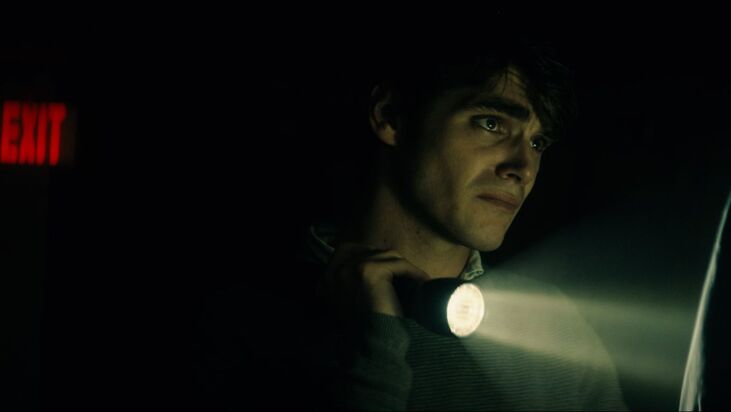[Fantasia 2020 Review] 'The Oak Room' is a Labyrinthine Trading of Tales Bristling with Tension8/24/2020  Stories are inherently enticing... ...Good, bad, or mediocre, once one starts, we keep thinking about it until there’s a resolution. Even if we don’t particularly care for the teller, the story holds a piece of us in sway. The Oak Room, making its world premiere at the 2020 Fantasia Film Festival and written by Peter Genoway and directed by Cody Calahan, relies on this relationship to storytelling to draw us under its spell. And what a spell it is. A spiraling patchwork of tension, memory, and violence, The Oak Room is an exercise in hanging on every word of storm-born stories. Steve (RJ Mitte) is a drifter returning home to retrieve his father’s remains and settle up on an old debt. At film’s opening, he rolls into the local bar, wrapped in the raging winter storm, trying to talk his way around the bartender, Paul (Peter Outerbridge). When he proposes settling the debt with something “better than cash”—a story—he’s met with rage and dismissal. Nevertheless, he pushes onward, enticing Paul with crumbs of a mystery he’s too angry at Steve to care about. Until that night, Steve hadn’t been in town since leaving for college, not even to attend his father, Gordon’s (Nicholas Campbell) funeral. Paul, meanwhile, had scraped money together and packed away Gordon’s life in the bar basement. Despite his rage at Steve, however, eventually the lure of a story draws Paul in enough to bite. What unfolds from there is a labyrinthine trading of tales between Steve, Paul, and the characters within the stories they’re telling. Story-weaving isn’t the film’s only strength, however. Cinematographer Jeff Maher paints a bleak yet beautiful picture with a faintly threatening air of repressed violence from first frame to last, and Steph Copeland’s music puts in just as much work setting the tone as any camera work. No story works without an effective narrator or compelling characters, of course, and The Oak Room delivers on both fronts, often simultaneously. RJ Mitte navigates the fine line between sinister and lighthearted with finesse as Steve. He knows exactly how and when he’s got Paul in his narrative trap, and how to bring him back into it when he wanders away. I’m not sure he ever doubted his ability to talk his way out of the debt as soon as he stepped into the bar, even when Paul forced him to face the ghost of his father. Ari Millen brings a quiet, vibrantly threatening air to Michael, the center of Steve’s story. Every character in the film is played with the same intensity and believability, but there’s just something special about the ability to play a muffled kind of threatening that stands out whenever I see it, and Oak Room has it in spades. I’m a sucker for films that center around storytelling and twisting what we think we know about a story in on itself, so it’s no surprise I was into the Oak Room from the start. There’s a power in telling stories that, while acknowledged, isn’t often used as a tool on its own. All filmmaking and writing is storytelling, of course, but to use the premise of telling a story as the driver for a film isn’t quite as common as simply letting events unfold. Slashers are uniquely lasting examples of how effective it can be. The films of Jason Voorhees and Michael Myers, for example, are nothing without at least an in-film acknowledgement of the campfire legends that built them. Travelers trading stories in weather-beaten circumstances are having a sporadic kind of renaissance in film recently. Quentin Tarantino took a crack at it with Hateful Eight, as did Drew Goddard’s Bad Times at the El Royale. Oak Room feels like a sinister sibling of these two, told in darker tones. I found by the end of the film that I felt wrapped in the kind of atmosphere this kind of tale was built for: crisp winter nights with a storm raging outside and a warm beverage cooling by your side as you inch closer to the edge of your seat, hanging on the teller’s every word. Even the film’s unanswered questions only add to the tension. Steve pushes Paul to hear the rest of his story by telling him the ending first and taunting him with an incomplete picture that doesn’t make sense without the beginning. He’s right, of course, and every tale in the film unfolds in this sort of reverse order, until we’re the ones left hanging on the edges of an unknown beginning resolving itself into an ominous end. It’s a brilliant slow burn built around tension that grips you before you feel it, and unquestionably one of my favorite films of the year. The Oak Room is now playing at Fantasia Film Festival. By Katelyn Nelson Enjoy Katelyn's writing? Leave her a tip here through Ko-fi!
0 Comments
Leave a Reply. |
Archives
March 2023
|


 RSS Feed
RSS Feed